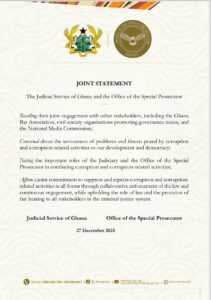The Judicial Service of Ghana and the Office of the Special Prosecutor (OSP) have expressed their joint commitment to fight corruption in the country.
According to a joint statement issued by the institutions on December 27, they will, nonetheless, ensure the prevalence of rule of law.
“We affirm a joint commitment to suppress and repress corruption and corruption-related activities in all forms through collaborative enforcement of the law and continuous engagement, while upholding the rule of law and the provision of fair hearing to all stakeholders in the criminal justice system.”
The statement further noted that this development followed, “joint engagement with other stakeholders, including the Ghana Bar Association, civil society organisations promoting governance issues, and the National Media Commission.”
This was necessitated by “the seriousness of problems and threats posed by corruption and corruption-related activities to our development and democracy; Noting the important roles of the Judiciary and the Office of the Special Prosecutor in combating corruption and corruption-related activities.”

It would be recalled that the Special Prosecutor, Kissi Agyebeng, complained about how judges dismiss cases his office presented in court.
“In one of the cases, I said a judge injuncted us from arresting a person. Mind you, we were not in court. We had declared the person wanted as a fugitive from justice, there was absolutely no enquiry as to why we believed that the person was a fugitive from justice so it is not as if we breached the law.
“No one asked us why we declared the person wanted. Then we were served with an injunction order that we cannot arrest the person meanwhile we know that in our law no one has the right not to be arrested. You cannot say you are granting a person a right not to be arrested.
“So when we receive judicial decisions like that it makes us assume that we are being prevented from arresting someone who is a fugitive from justice” he lamented.
It is believed that the meeting between the two agencies was ocassioned by these sentiments expressed by the Special Prosecutor, which engendered a huge public debate.








